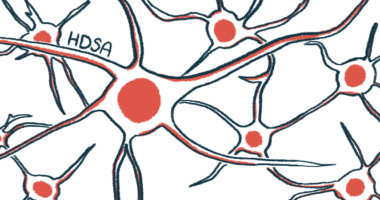Researchers Find Genetic Overlap Between Psychiatric Disorders and Psychiatric, Cognitive Symptoms in Huntington’s

Psychiatric and cognitive symptoms in Huntington’s disease share genetic traits with psychiatric disorders and intelligence, respectively, according to a study.
These findings suggest that current treatments used for depression and psychotic symptoms in the overall population may also be able to treat these symptoms in Huntington’s patients.
The study, “Genetic risk underlying psychiatric and cognitive symptoms in Huntington’s Disease,” is available on the bioRxiv pre-print server.
Huntington’s disease is a genetic neurodegenerative disorder caused by excessive repeats of a portion of DNA, called CAG triplets, within the huntingtin (HTT) gene. With a wide spectrum of signs and symptoms, the disease is mainly characterized by motor problems. Many patients also develop cognitive, behavioral, and psychiatric disturbances, which are often present before the onset of motor symptoms.
While genetic specificities, such as the length of the CAG repeats in the HTT gene, have been shown to determine the age at which motor symptoms appear in Huntington patients, genetic influences on behavioral and psychiatric symptoms in these patients remain unexplored.
Researchers evaluated whether psychiatric and cognitive symptoms in Huntington’s disease were influenced by the same genetic factors as psychiatric and neurodegenerative disorders, as well as intelligence, in the general population.
They generated polygenic risk scores (PRS) of psychiatric and neurodegenerative disorders, and of intelligence, and assessed their potential association with the presence of psychiatric and cognitive symptoms in a large sample of Huntington’s patients.
A PRS, or genetic risk score, is the cumulative risk derived from aggregating contributions of the DNA mutations associated with a complex trait or disease. It can be used to determine someone’s genetic predisposition to developing a disease or a specific trait.
PRS are generated using an algorithm developed from genome-wide association (GWA) studies that identify all the genetic changes associated with a disease or trait of interest, and their different weights to the risk.
In this study, genetic risk scores were generated for six psychiatric disorders (schizophrenia, bipolar disorder, attention deficit hyperactivity disorder, autism spectrum disorder, obsessive compulsive disorder, and depression), two neurodegenerative diseases (late-onset Alzheimer’s disease and Parkinson’s disease), and intelligence, using the latest available large GWA studies.
The team analyzed the clinical and genetic data of 5,854 Huntington’s patients who were part of the European REGISTRY study (NCT01590589) or its successor, the international Enroll-HD (NCT01574053) observational study of Huntington’s disease.
They examined the frequency of seven Huntington’s non-motor symptoms: depression, irritability, psychosis, apathy, violent/aggressive behavior, perseverative/obsessive behavior, and cognitive impairment.
The frequency of each symptom in these patients (who had at least one of the symptoms) varied from 10.8% (psychosis) to 66% (depression), and there was a significant association among symptoms, resulting in patients with multiple symptoms.
Depression was significantly more common in women, while irritability and violent/aggressive behavior were both more frequently seen in men.
The analysis of the associations between the nine genetic risk scores and the seven symptoms included only 5,160 patients, whose individual genetic risk for each psychiatric/neurodegenerative disorder was calculated through the polygenic risk score.
Results showed that the PRS of depression was specifically associated with an increased risk of depression in Huntington’s patients, as was the schizophrenia risk score with psychosis and irritability, and bipolar disorder risk score with violent/aggressive behavior.
“In general, polygenic risk scores for psychiatric disorders, particularly depression and schizophrenia, are associated with increased risk of the corresponding psychiatric symptoms in HD [Huntington’s disease], suggesting a common genetic liability,” the researchers wrote.
Cognitive impairment and apathy were specifically associated with a lower risk score for intelligence. Since these traits showed no associations with PRS of psychiatric disorders, they may have distinct genetic causes from other psychiatric symptoms in Huntington’s.
“This suggests that apathy in HD should be considered as a cognitive, rather than psychiatric, symptom … and is also consistent with apathy being the only psychiatric symptom to correlate with disease progression,” they wrote.
Furthermore, the analyzed non-motor symptoms showed no associations with risk scores for Alzheimer’s or Parkinson’s, suggesting different underlying mechanisms between psychiatric and neurodegenerative symptoms.
The team noted the results “indicate that even in diseases previously assumed to be entirely attributable to single genetic variants [mutations], there is a contribution of polygenic risk in influencing phenotypic [symptom] presentation.”
They concluded by stating that the data suggests that “treatments used in the wider population for depression and psychotic symptoms [may be] used for these symptoms in HD.”






